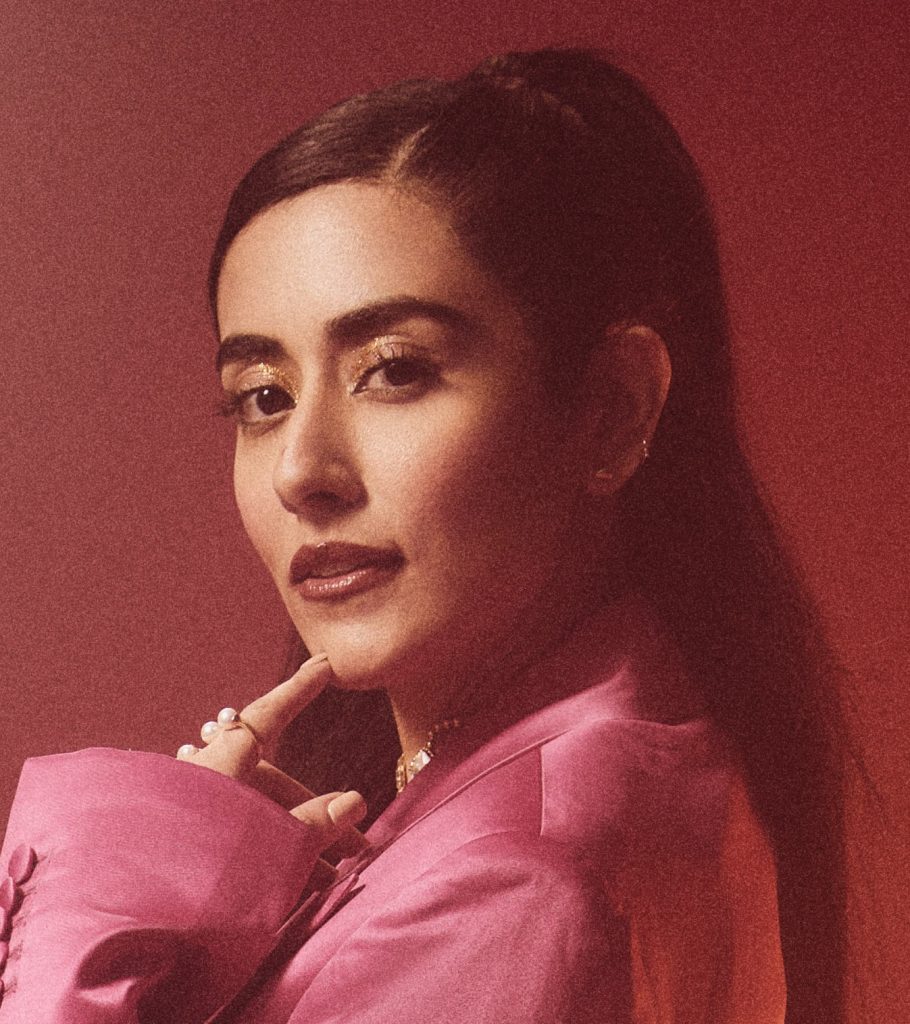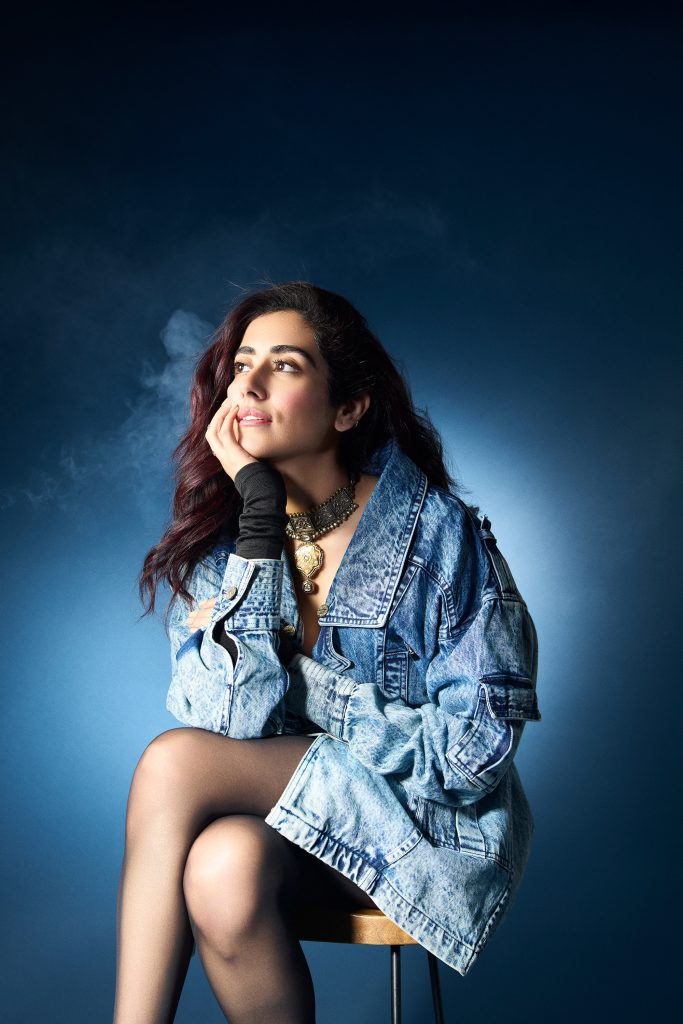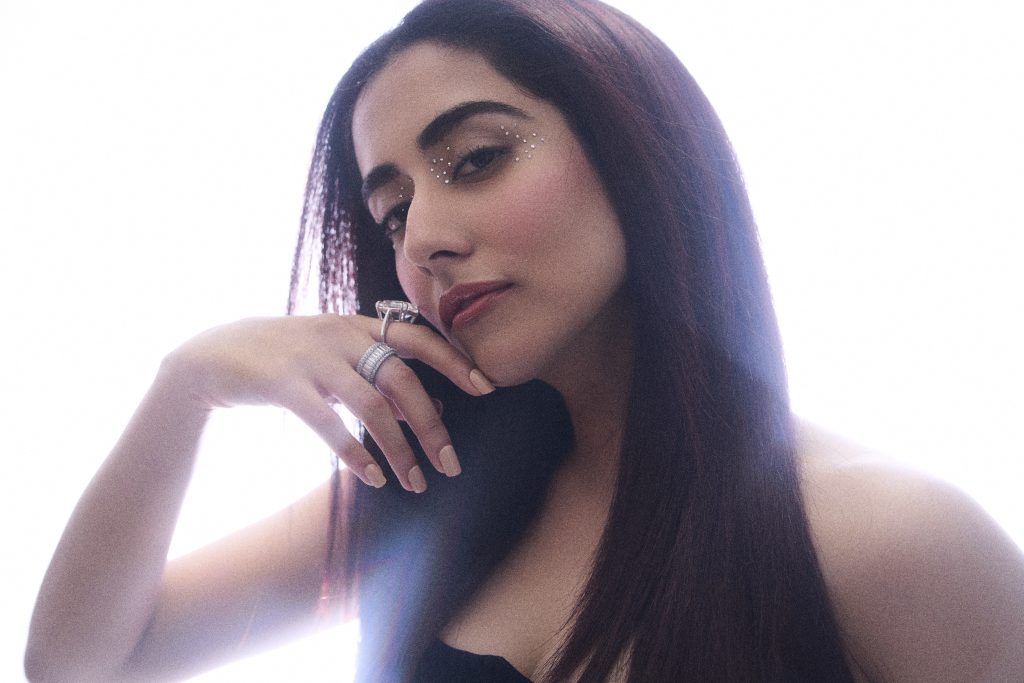When it comes to seamlessly blending Eastern and Western musical traditions, few artists exemplify this fusion as brilliantly as Jonita Gandhi. Dubbed “Toronto’s Nightingale,” Jonita has enchanted millions with her versatile singing across various genres and languages since her debut as a playback singer in Bollywood in 2013. This year, she ventured into the Western music scene with her English language debut single, “Love Like That,” released in January 2024, signalling her bold foray into Hollywood.
Jonita describes her sound as “an organic blend of my worlds beautifully and thematically coming together.” Her single showcases her musical range and sets the stage for her full debut album of the same title, released in February 2024. As the first female artist signed to 91 North Records, Jonita pours elegance, experience, and relentless determination into her music. A celebrated figure in India with a prolific Bollywood career, Jonita’s Western debut is a significant milestone, deepening her connection with her audience and highlighting her artistic essence.

In our exclusive interview, Jonita Gandhi joined us from Mumbai to discuss her latest project and the inspirations behind her debut album. She delves into the creative process, her journey navigating the global music landscape, and how she bridges two distinct yet interconnected worlds through her art. This conversation offers a rare glimpse into the mind of an artist reshaping the future of music with her unique fusion of East and West. Read on for the full Q&A!
Your debut EP, “Love Like That,” explores themes of love and identity through a diverse range of songs. What inspired this project, and what personal stories does it convey?
My EP, “Love Like That,” has been a long time coming. It means a lot to me to finally have a voice in my music and be able to talk about my experiences and influences in my music. Until now, I’ve been singing a lot but not expressing as much. So, I love that, in this EP, I could put together sounds that move me and words that provide a window into my multicultural experience as an Indian who grew up in Canada and then became a Bollywood and Kollywood singer! Also, it was a platform for me to be vulnerable and reflect on my experiences with love and relationships.
As you’ve mentioned about your multicultural upbringing, how did you balance your Indian roots with Western influences in your music? What do you hope listeners take away from this crossover?
I hope listeners will feel the lines for languages and genres blurring. I have always felt restricted by genres, and now I’ve started to accept and celebrate being able to weave in and out of Indian modes and R&B runs. I hope people relate to my music regardless of where they’re from, what language they speak, and what genre they listen to!
“Madhaniya” is a popular Punjabi folk song with many versions already. What makes your rendition unique?
I remember when we made this one, there was concern from a couple of people that this song had been done to death. But I really felt it has never been done in this way, and that I could add a unique approach to it. We only took the central line from the folk song and added new verses in Punjabi and English. Regardless of being able to do justice to such a classic folk melody or not, this song is tied to my upbringing and part of the journey and story that make me an artist. So, it was non-negotiable for me to include it in the EP! Our version expands on the theme that drives the song and applies it to a new context, and I really feel our version makes it relatable to both men and women in a fresh way.
Is there a specific song from the EP that holds a special meaning to you, and if so, why?
Of course, I love all four songs like they’re my babies, but I think I have a special connection with “Tu Jaane.” That was the first one of the lot (chronologically) to have been written, and I really feel that one shaped the sound for the rest of the EP. Not to mention it being borne out of a very emotional experience I’ve had!
How did your collaboration with Ali Sethi on “Love Like That” come about?
I have followed Ali’s work for several years and hoped to collaborate with him. When I found out we were both in LA at the same time, I asked him if he was open to coming to swinging by one of my writing sessions and he was more than happy to do so. Next thing we knew, “Love Like That” was born.
Could you please provide insight into the concept and production process of the stunning accompanying music video? What was your level of involvement in the process?
The “Love Like That” music video was a labour of love. I had a beautiful time working with the entire crew, Ali Sethi, and the director, Priya Minhas on set. I met Priya while she was visiting Mumbai, played her the song, and told her the vision behind it. She loved the song and came on board to conceptualize and direct the music video as she and I both connected on our goal to represent Indian themes progressively.
Your career as a playback singer took off with ‘Chennai Express,’ and now you’re dominating the charts with hits like ‘The Breakup Song,’ ‘Allah Duhai Hai,’ and ‘What Jhumka’. How did you land your first gig, and did that initial success pave the way for your career in the industry?
I was discovered via my covers on YouTube. I started recording videos of myself covering popular English and Indian songs when I was nearing the end of my university education, and some of them sort of took off. People in the Indian film industry and listeners worldwide took note. These covers served as demos for me, and it was how I landed my first Bollywood gig – opening for Sonu Nigam during his North American tour in 2012. After that, one thing led to another and I found myself singing for Bollywood films within a year of shifting base to Mumbai!
I’ve been diving deep into your discography and it’s safe to say you’ve collaborated with topmost talents in the Hindi industry and are living the dream! How would you summarize your decade-long Bollywood ride up to this point?
It has been a crazy ride. I’m blessed to have worked with many incredible people along my journey! Collaborating has taught me much about what I’m capable of and what I can do with my voice. It’s equipped me with a skillset to progress further and discover the artist within!
I know it’s tough to pick favourites, but if you had to vibe check, who would be your top 3 collaborators you enjoyed working with the most?
You’re 100% right about it being a tough pick! Collaborating with Ali Sethi for “Love Like That” was incredibly special to me for so many reasons, but at the top of that list of reasons is because it was my own song, and without Ali, it would not have been what it turned out to be! I’ve been fortunate to have collaborated with the legendary A.R. Rahman since early in my professional career. He’s helped me discover that I could seamlessly mix my Eastern and Western vocal styles, and that’s been a big inspiration in developing my sound. I think, I took that inspiration and honed it with Ariza, the producer behind my debut EP “Love Like That”, and found what I truly feel is my sound while working with him!
I’m incredibly in awe of your perseverance. How did you maintain motivation despite initial scepticism about your unique vocal style post-Canadian Idol audition? Do you have a message for those who fail to appreciate the beauty of embracing diverse influences?
I don’t think quitting was ever really an option for me. I wouldn’t say that early rejection fueled my determination but I do think it was a good learning experience. The message that I would send out to anyone for that matter, is that the world is becoming smaller and smaller, and it is becoming more and more possible to reach global audiences with eclectic music.
As a versatile artist skilled in multiple languages, what challenges have you faced while interpreting and performing in various languages, and do you have a preferred language to sing in?
I guess my favourite language to sing would be English because I grew up in Canada and think in English. Singing in languages you don’t speak is challenging, but it is fulfilling for me as well. I love it when people tell me they couldn’t tell I wasn’t a native language speaker when they heard me sing. Creating your own legend when you transcribe the lyrics of a song in a language that is foreign to you, with markings for remembering certain sounds, always helps me.

Reflecting on your journey thus far, what notable milestones do you consider among your proudest, and how have they influenced your views on success and fulfilment?
The thing that stands out to me on my journey is the amount of faith I would have had to leave my home and family in Toronto and come to India to pursue a career. I feel like I was very responsible about the way I did it; given how my career has evolved from then until now and how much of a payoff I’ve had from taking that risk, that one leap of faith makes me feel the most proud of myself.
As a role model for young female artists of South Asian heritage, what message do you aim to convey to your fans through your music?
I want to convey that we need more women carving the path for other women. There are so many male success stories in South Asian music and I feel like women are no less and it’s just a matter of changing the public and industry mindsets. I think if there are more of us who attempt, there will be more of us who succeed!
As we wrap, how do you see your music evolving from here? Are you planning to release new music?
I am trying to let it flow naturally. I don’t want to overhype myself or overplay where I want my songs to go. I am aware that as I evolve, my music will evolve too, and that’s okay. I really want people to be on this journey with me and to be ready for the music that comes their way. There’s a lot of new music in store and I think as they get to know me more, they’ll enjoy what’s yet to come as much as I do!
Listen to “Love Like That” EP below:
Don’t forget to share your thoughts with us on X (formerly Twitter) at @Celebmix!

